Appendix BFOR PHYSICS AND PHYSICS and PHILOSOPHY STUDENTSCalculators for ALL Public Examinations*The regulations are likely to follow recent practice which is:A candidate may bring a pocket calculator into the examinationprovided the calculator meets the conditions set out as follows:• The calculator must not require connection to anyexternal power supply.• It must not be capable <strong>of</strong> communicating (e.g. by radio)with any other device.• It must not make a noise that could irritate or distractother candidates.• It must not be capable <strong>of</strong> displaying functions graphically.• It must not be capable <strong>of</strong> storing and displaying text,other than the names <strong>of</strong> standard functions such as‘sin’ or ‘cosh’.• It must not be able to store programs or user-definedformulae.• It must not be able to perform symbolic algebra, orperform symbolic integration or differentiation.Notes:These guidelines follow closely the regulations on the ‘Use<strong>of</strong> calculators in Examinations’ in the <strong>University</strong> ExaminationRegulations (‘The Grey Book’).The exact requirements in a given year will be published by theExaminers. For some Prelims papers in Maths calculators arenot allowed at all.The intention <strong>of</strong> the rules is to prevent the possibility <strong>of</strong> a candidateobtaining an advantage by having a powerful calculating aid (or<strong>of</strong> reading stored information as a substitute for knowing it). It isappreciated that candidates may already own calculators that areexcluded by these rules. In such a case the candidate is responsiblefor obtaining a more basic calculator that is within the rules,and for becoming familiar with it in advance <strong>of</strong> the examination.• Within the above, the calculator may be capable <strong>of</strong>working out mathematical functions such as sin(x), log(x),exp(x), x y and it may contain constants such as π.• The examiners may inspect any calculator during thecourse <strong>of</strong> the examination.* for the Physics papers when the use <strong>of</strong> calculators is permitted36
Appendix CPreliminary Examination in PhysicsFOR FIRST YEAR STUDENTSEach <strong>of</strong> the Papers CP1 - CP4 is a 2½ hour paper in two sectionsSection A: Short compulsory questions (total marks 40)Section B: Answer 3 problems from 4 (total marks 60)Syllabuses for CP1 CP2, CP3 and CP4.also Preliminary Examination in Physics and PhilosophySyllabuses for CP1, CP3, CP4Part A Physics and Philosophy A2P (CP2 without Circuit Theory and Optics)CP1: Physics 1Newton’s law <strong>of</strong> motion. Mechanics <strong>of</strong> particles in one dimension.Energy, work and impulse. Conservation <strong>of</strong> linear momentumincluding problems where the mass changes, e.g. the motion <strong>of</strong> arocket ejecting fuel. Conservation <strong>of</strong> energy.Vector formulation <strong>of</strong> Newton’s law <strong>of</strong> motion. Time-dependentvectors and differentiation <strong>of</strong> vectors.Mechanics <strong>of</strong> particles in two dimensions. Equations <strong>of</strong> motionin Cartesian and plane polar co-ordinates. Simple cases <strong>of</strong> themotion <strong>of</strong> charged particles in uniform E and B fields.Projectiles moving under gravity, including such motion subject toa damping force proportional to velocity. Dimensional Analysis.Systems <strong>of</strong> point particles. Centre <strong>of</strong> mass (or momentum) frameand its uses. Torque and angular momentum. Conservation <strong>of</strong>angular momentum. Two-body collisions.Central forces. Importance <strong>of</strong> conservation <strong>of</strong> energy and angularmomentum. Classification <strong>of</strong> orbits as bound or unbound(derivation <strong>of</strong> equation for u=1/r not required; explicit treatment<strong>of</strong> hyperbolae and ellipses not required). Inverse square centralforces. Examples from planetary and satellite motion and motion<strong>of</strong> charged particles under the Coulomb force. Distance <strong>of</strong> closestapproach and angle <strong>of</strong> deviation.Calculus <strong>of</strong> variations. Principle <strong>of</strong> stationary action (Hamiltonprinciple). The Euler-Lagrange equation. Constraints. Applicationto particle motion in one and two dimensions. Small oscillations,normal coordinates. Compound pendulum. Conservation laws.Noether’s theorem. The Hamiltonian and energy conservation.Moment <strong>of</strong> inertia <strong>of</strong> a system <strong>of</strong> particles. Use <strong>of</strong> perpendicularandparallel-axis theorems. Moment <strong>of</strong> inertia <strong>of</strong> simple bodies.Simple problems <strong>of</strong> rigid body dynamics. Angular impulse,collision and rolling. The concept <strong>of</strong> principal axes. Angularmomentum and total energy in rigid body rotation.Special RelativitySpecial theory <strong>of</strong> relativity restricted throughout to problems inone or two space dimensions. The constancy <strong>of</strong> the speed <strong>of</strong> light;simultaneity. The Lorentz transformation (derivation not required).Time dilation and length contraction. The addition <strong>of</strong> velocities.Invariance <strong>of</strong> the space-time interval. Proper time.Energy, momentum, rest mass and their relationship for a singleparticle. Conservation <strong>of</strong> energy and momentum and the use <strong>of</strong>invariants in the formation sub-atomic particles. Elementarykinematics <strong>of</strong> the scattering and decay <strong>of</strong> sub-atomic particles,including photon scattering. Relativistic Doppler effect (longitudinalonly).CP2: Physics 2The treatment <strong>of</strong> electromagnetism is restricted to fields in vacuo.Vector operator identities required will be given on the data sheetand complicated manipulations <strong>of</strong> vector operators will not be set.ElectromagnetismCoulomb’s law. The electric field E and potential due to a pointcharge and systems <strong>of</strong> point charges, including the electric dipole.The couple and force on, and the energy <strong>of</strong>, a dipole in an externalelectric field. Energy <strong>of</strong> a system <strong>of</strong> point charges; energy storedin an electric field. Gauss’ Law; the E field and potential due tosurface and volume distributions <strong>of</strong> charge (including simpleexamples <strong>of</strong> the method <strong>of</strong> images), no field inside a closed conductor.Force on a conductor. The capacitance <strong>of</strong> parallel-plate,cylindrical and spherical capacitors, energy stored in capacitors.The forces between wires carrying steady currents. The magneticfield B, Ampere’s law, Gauss’ Law (“no magnetic monopoles”),the Biot-Savart Law. The B field due to currents in a long straightwire, in a circular loop (on axis only) and in straight and toroidalsolenoids. The magnetic dipole; its B field. The force and coupleon, and the energy <strong>of</strong>, a dipole in an external B field. Energystored in a B field.The force on a charged particle in E and B fields.Electromagnetic induction, the laws <strong>of</strong> Faraday and Lenz. EMFsgenerated by an external, changing magnetic field threading acircuit and due to the motion <strong>of</strong> a circuit in an external magneticfield, the flux rule. Self and mutual inductance: calculation forsimple circuits, energy stored in inductors. The transformer.Charge conservation, Ampere’s law applied to a charging capacitor,Maxwell’s addition to Ampere’s law (“displacement current”).Maxwell’s equations for fields in a vacuum (rectangular coordinatesonly). Plane electromagnetic waves in empty space:their speed; the relationships between E, B and the direction <strong>of</strong>propagation.Circuit TheoryEMF and voltage drop. Resistance, capacitance, inductance andtheir symbolic representation. Growth and decay <strong>of</strong> currents incircuits, time constant. The concept <strong>of</strong> complex impedance insteady-state AC circuit analysis.Ideal Op-amp: inverting and non inverting amplifier circuits;summation, integration and differentiation circuits.37


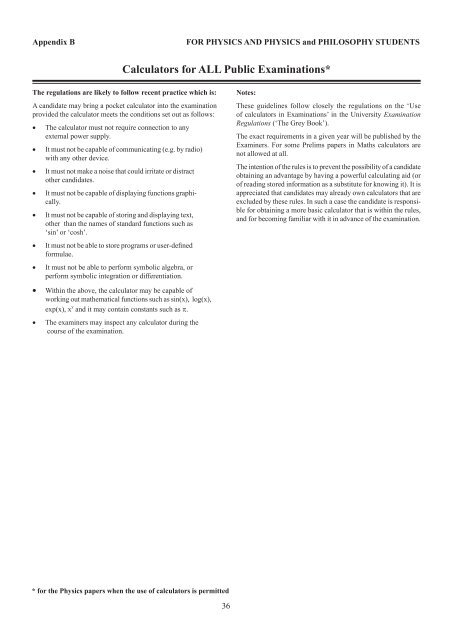
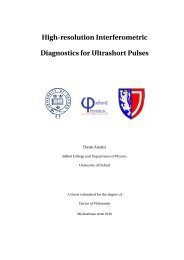
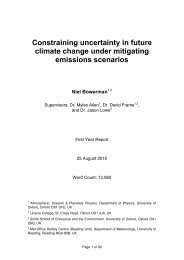
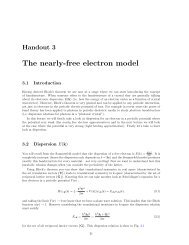
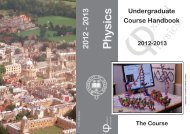
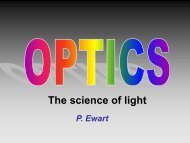
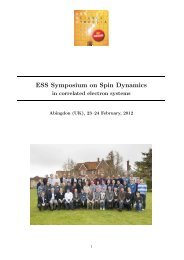
![Extended Notes 8 [pdf]](https://img.yumpu.com/50123548/1/190x245/extended-notes-8-pdf.jpg?quality=85)
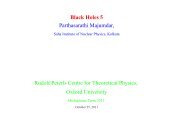
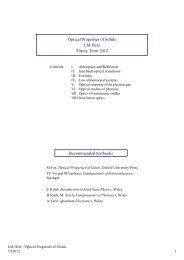
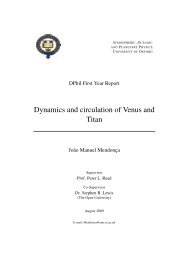
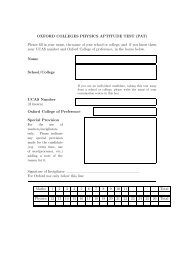
![Handout 3 [pdf] - University of Oxford Department of Physics](https://img.yumpu.com/46475432/1/190x245/handout-3-pdf-university-of-oxford-department-of-physics.jpg?quality=85)